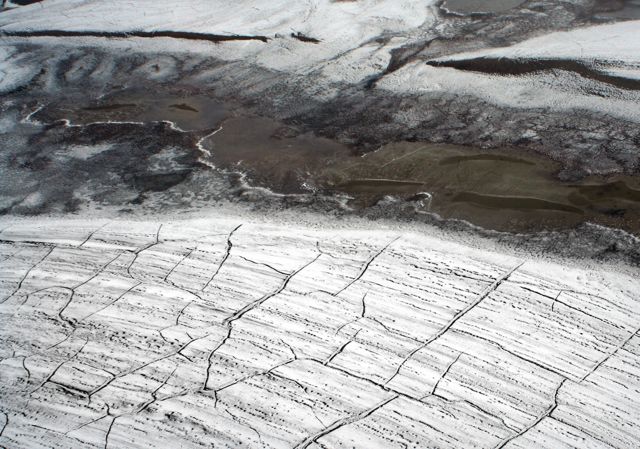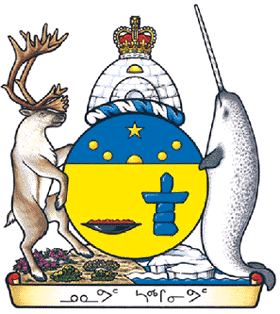|
|
|
|
|
|
|
|
|
No Arctic-science event is scheduled for today.
|
Permafrost is Thawing so Fast, It's Gouging Holes in the Arctic. It's perhaps the best known and more worrisome of climate feedback loops: As the planet warms, permafrost-landscapes of frozen soil and rock-begins to thaw. And when it does, microbes consume organic matter, releasing CO2 and methane into the atmosphere, leading to more warming, more thawing, and even more carbon emissions. But here's something you've probably never heard of, and it's something not even the UN's Intergovernmental Panel on Climate Change has really considered: thermokarst. That's the land that gets ravaged whenever permafrost thaws rapidly. WIRED
 Arctic Permafrost Thaw Plays Greater Role in Climate Change than Previously Estimated. Arctic Permafrost Thaw Plays Greater Role in Climate Change than Previously Estimated. Abrupt thawing of permafrost will double previous estimates of potential carbon emissions from permafrost thaw in the Arctic, and is already rapidly changing the landscape and ecology of the circumpolar north, a new CU Boulder-led study finds. Permafrost, a perpetually frozen layer under the seasonally thawed surface layer of the ground, affects 18 million square kilometers at high latitudes or one quarter of all the exposed land in the Northern Hemisphere. Current estimates predict permafrost contains an estimated 1,500 petagrams of carbon, which is equivalent to 1.5 trillion metric tons of carbon. Phys.org
Arctic Conservation: Scientists Listen to the Sounds of the Seascape. A year-round acoustic study of marine mammals in the northern Bering Sea is providing scientists with a valuable snapshot of an Arctic world already under immense pressure from climate change, according to WCS (Wildlife Conservation Society), Columbia University, Southall Environmental Associates, and the University of Washington. Open Access Government
 Nunavut Children Experience the Highest Poverty Rate in Canada: Report. Nunavut Children Experience the Highest Poverty Rate in Canada: Report. Nunavut has the highest child poverty rate in the country, according to a new report from Campaign 2000, a pan-Canadian coalition on child and family poverty. At 31.2 per cent, Nunavut's child poverty rate is well above the Canadian average of 18.6 per cent for children under the age of 18, according to the Report Card on Child and Family Poverty in Canada. Nunatsiaq Online
Suicide Prevention Workshop Launches in Nunavik. As part of Suicide Prevention Week, Nunavik's health board is launching a series of workshops on suicide prevention across the region. "We are quite proud of the official launch of the Reach Out workshop. It is developed by Inuit for Inuit; it exemplifies the importance for solutions to come from our own communities," said Minnie Grey, executive director of the Nunavik Regional Board of Health and Social Services, in a Feb. 3 news release. Nunatsiaq Online
The Arctic's Future Population Will Likely be More Urban, More Aged-and Only Slightly Bigger. The Arctic's population is expected to remain stable through the middle of the century, but there are likely to be wide differences in how residents are distributed around the North, a new study says. By the middle of the 21st century, the Arctic population is expected to increase by only 1 percent, compared to a global population that is expected to swell from 7.4 billion in 2015 to 10 billion in 2055, according to the study by Timothy Heleniak, a researcher based at the Stockholm-based Nordic research center Nordregio. Arctic Today
|
|
Future Events
Polar Extremes: NOVA Special, February 5, 2020 (Television special). Hosted by palaeontologist Kirk Johnson, Sant Director of the Smithsonian's National Museum of Natural History, (and the Principal for the Smithsonian Institution) the NOVA program "Polar Extremes" features a pole-to-pole presentation of the history of the planet's Arctic and Antarctic regions over the past 650 million years and how these regions have responded to, and helped create, global climate change. Check your local listing for broadcast times. The time here is for WETA Washington, DC.
** New this week ** Fletcher Arctic Conference, February 7-8, 2020 (Medford, MA). The Fletcher School at Tufts University will hold its 2020 conference titled, "The Kaleidoscope of Arctic Security: The Evolution of Human, Soft and Hard Security in the Arctic Region." Please register here. The opening panel discussion, on Friday, Feb. 7th, features a discussion on "Essential Elements of Arctic Environmental Sustainability," moderated by Fletcher student Ms. Aesclinn Donohue, and including panelists Mr. Inuuteq Holm Olsen (Minister Plenipotentiary and Head of Representation at the Greenland Representation at the Danish Embassy in Washington, DC), Mr. Ben Ford (Partner, Verrill-Dana LLP), Dr. Rebecca Pincus (Assistant Professor, US Naval War College), and Dr. John Farrell (Executive Director, US Arctic Research Commission).
Jim Thomson: Ocean Waves in the New Arctic, February 7, 2020 (Webinar). The rapid decline of summer sea ice cover in the Western Arctic has been accompanied by a dramatic increase in the sea state of the region. Ocean waves are now more common throughout the region, including multiple energetic swell events each summer. These waves interact with the sea ice and help to both form and define the expanding Marginal Ice Zone of the Western Arctic. This seminar will review recent work to observe and forecast changes in the Arctic sea state, including implications for sea ice retreat and coastal morphology.
Alaska Forum on the Environment, February 10-14, 2020 (Anchorage, Alaska USA). The 22nd Alaska Forum on the Environment will be held February 10-14, 2020, offering 6 Keynote Events, over 100 presentations, panel discussions, special events and workshops. Technical sessions include: climate change, emergency response, brownfields, marine debris, environmental regulations, fish and wildlife, forests, rural issues, energy, military issues, business issues, pollution prevention, contaminants, and more.
ISAR-6: Arctic Research: the Decade Past and the Decade Future, March 2-6, 2020 (Tokyo, Japan). Rapid changes are taking place in the Arctic that impact regional human and natural systems, and affect the global environment. The International Symposium on Arctic Research (ISAR) will meet for the sixth time since its first symposium in 2008 to identify changes in the Arctic environment and society, and to discuss possible future sustainable development. The hosts invite all researchers with interests in the Arctic to participate in this multidisciplinary symposium and share their insights, their challenges, and to explore the possible futures of the Arctic.
 International One Health, One Future 2020 International Conference, March 11-14, 2020 (Fairbanks, Alaska USA). This year's conference, presented by University of Alaska Fairbanks Center for One Health Research in partnership with the U.S. Department of State, will host internationally recognized keynote speakers across eight themes. There will be something for all stakeholders - community members, health care providers, state and federal agency employees, researchers, educators and students. One Health recognizes the interdependence of human, animal and environmental health, and that a holistic approach to the well-being of all will lead to improved health outcomes and enhanced resilience.
Linking Experts in Polar Science and Technology, March 12, 2020 (Boulder, Colorado USA). The Polar Technology Conference (PTC) brings together polar scientists, technology developers, and field technicians from academia, state and federal agencies, the private sector, and non-governmental organizations. This interdisciplinary space provides an opportunity for technical and theoretical exchange on challenges impeding polar research and field operations. Community input is crucial to ensure that technological infrastructure investments are efficient, satisfy science drivers, and meet field requirements. The conference will address approaches to working and studying in the polar regions, including: terrestrial, marine, atmospheric, and social science disciplines; autonomous instrumentation; observation platforms; and all levels of logistical support.
High North Dialogue, March 18-19, 2020 (Bodø, Norway). Since 2007, the High North Dialogue conference series have brought together leaders of the High North - present and future - to discuss the dimensions of the changes taking place in the Arctic. The High North Dialogue 2020 will provide you with a different perspective on the future of the High North. The theme of the 2020 conference is "Business in the Arctic." The conference also includes Master and PhD courses, a research workshop, breakout sessions, the High North Hero award, and the High North Young Entrepreneur contest. Please visit our website for more information.
Arctic Science Summit Week and the 5th Arctic Observing Summit. March 27 to April 2, 2020, (Akureyri, Iceland).
The Arctic Observing Summit (AOS) is a high-level biennial summit that provides a platform to address urgent and broadly recognized needs of Arctic observing across all components of the Arctic system. The theme of AOS 2020 is Observing for Action. AOS 2020 will be held in Akureyri, Iceland (March 31-April 2) and will focus on pressing issues related to the use, design, optimization and implementation of the observing system. To that end, submissions in the form of white papers, short statements and poster abstracts are requested that address any and all aspects of the overarching theme and sub-themes.
North x North Festival + Critical Futures, April 13-19, 2020 (Anchorage, Alaska USA). North x North celebrates connection, creativity, imagination and innovation across the Circumpolar North and convenes people worldwide for a discussion about possible futures. It begins with Critical Futures, a creative conference that focuses on language, visuals and ideas for creatively and critically thinking about the future and responding to climate change, and ends with a Fest featuring film, food and music. This event is hosted by the Anchorage Museum.
 The 7th Annual Arctic Encounter, April 16-17, 2020 (Seattle, WA USA). The 2019 Arctic Encounter Seattle drew participants and stakeholders from over 20 nations, including over 80 speakers, 27 sponsors, 17 media partners, northern fashion and photography art installations, 13 guest performers, the second annual Far North Fashion Show, live podcast recording sessions, musical and spoken word performances, and over 10 artist exhibitors. The 2020 Arctic Encounter Seattle expects to increase engagement in new sectors and engage participants through policy debates, research presentations, live performances, and more. The Arctic Encounter is the largest annual Arctic policy and business conference convening in the United States, with partnerships and convening efforts worldwide. The 7th Annual Arctic Encounter, April 16-17, 2020 (Seattle, WA USA). The 2019 Arctic Encounter Seattle drew participants and stakeholders from over 20 nations, including over 80 speakers, 27 sponsors, 17 media partners, northern fashion and photography art installations, 13 guest performers, the second annual Far North Fashion Show, live podcast recording sessions, musical and spoken word performances, and over 10 artist exhibitors. The 2020 Arctic Encounter Seattle expects to increase engagement in new sectors and engage participants through policy debates, research presentations, live performances, and more. The Arctic Encounter is the largest annual Arctic policy and business conference convening in the United States, with partnerships and convening efforts worldwide.
|
|

  
4350 N. Fairfax Drive, Suite 510
Arlington, VA 22203, USA
External links in this publication, and on the USARC's World Wide Web site ( www.arctic.gov) do not constitute endorsement by the US Arctic Research Commission of external Web sites or the information, products or services contained therein. For other than authorized activities, the USARC does not exercise any editorial control over the information you may find at these locations. These links are provided consistent with the stated purpose of this newsletter and the USARC Web site.
|
|
|
|
|
|
|
|
|